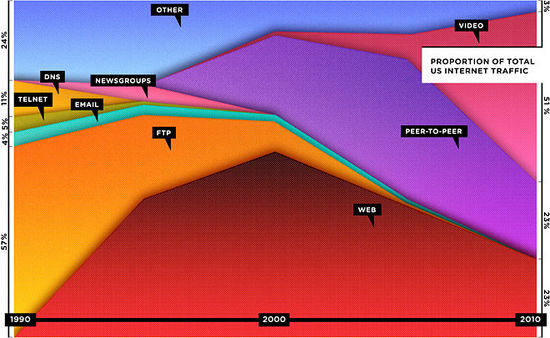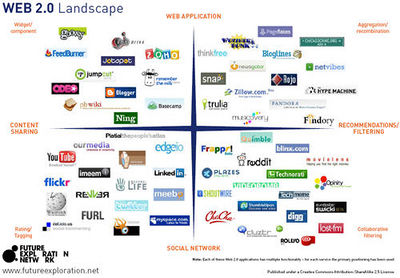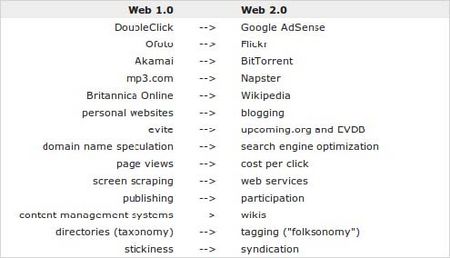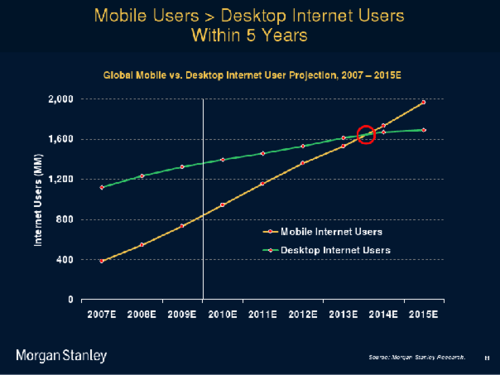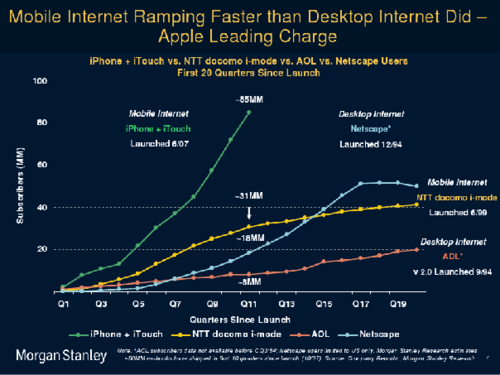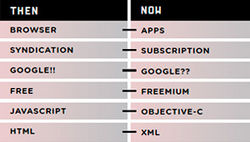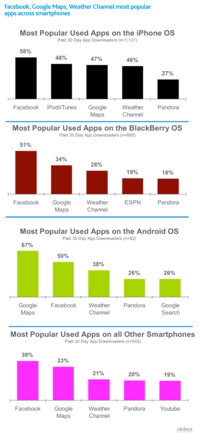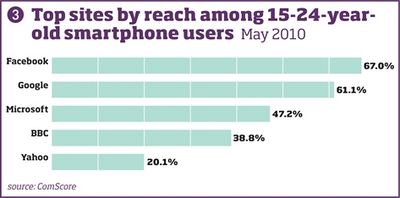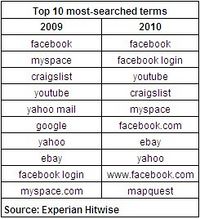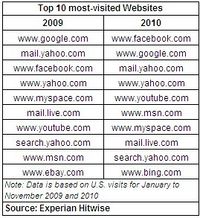The Web is dead, long live the Internet
From IT
| Line 81: | Line 81: | ||
As we said in the first paragraph, Facebook as passed Google in visits number in 2010. In fact, facebook was the fist website to be searched in 2009 and 2010 and in the last year was the first to be visited. | As we said in the first paragraph, Facebook as passed Google in visits number in 2010. In fact, facebook was the fist website to be searched in 2009 and 2010 and in the last year was the first to be visited. | ||
| + | |||
| + | |||
| + | [[File:2010Top10terms.jpg|200px|thumb|left|image 9]] [[File:2010Top10sites.jpg|200px|thumb|image 10]] | ||
As Wolff says in his article also at the top of the list of more influent entrepreneurs things have changed: | As Wolff says in his article also at the top of the list of more influent entrepreneurs things have changed: | ||
| - | Then Now | + | |
| - | Eric Schmidt (Google) Mark Zuckerberg (Facebook) | + | |
| - | Marc Andreessen (Netscape) Steve Jobs (Apple) | + | {| class="wikitable" |
| - | Shawn Fanning (Napster) Daniel Ek (Spotify) | + | |- |
| - | Michael Moritz (Google) Yuri Milner (Facebook) | + | ! Then |
| - | Chad Hurley (Youtube) Jason Kilar (Hulu, Amazon) | + | ! Now |
| - | Jerry Yang (Yahoo) Mark Pincus (Zynga) | + | |- |
| - | Evan Williams (Blogger) Evan Williams (Twitter) | + | | Eric Schmidt (Google), Mark Zuckerberg (Facebook) |
| + | | Mark Zuckerberg (Facebook) | ||
| + | |- | ||
| + | | Marc Andreessen (Netscape) | ||
| + | | Steve Jobs (Apple) | ||
| + | |- | ||
| + | | Shawn Fanning (Napster) | ||
| + | | Daniel Ek (Spotify) | ||
| + | |- | ||
| + | | Michael Moritz (Google) | ||
| + | | Yuri Milner (Facebook) | ||
| + | |- | ||
| + | | Chad Hurley (Youtube) | ||
| + | | Jason Kilar (Hulu, Amazon) | ||
| + | |- | ||
| + | | Jerry Yang (Yahoo) | ||
| + | | Mark Pincus (Zynga) | ||
| + | |- | ||
| + | | Evan Williams (Blogger) | ||
| + | | Evan Williams (Twitter) | ||
| + | |} | ||
| + | |||
Google, having the biggest market value,USD 186 billion, and because it seems to be the most solid and long-lasting company, is the milestone and the model of all new web entrepreneurs as Wolff describes in his article. | Google, having the biggest market value,USD 186 billion, and because it seems to be the most solid and long-lasting company, is the milestone and the model of all new web entrepreneurs as Wolff describes in his article. | ||
Revision as of 12:09, 11 January 2011
“As much as we love the open, unfettered Web, we’re abandoning it for simpler, sleeker services that just work.” by Chris Anderson
In this article published on WIRED on August 17th 2010 Chris Anderson and Michael Wolff talk about evolution of internet usage (“who is to blame: Us”, the internet user. Because internet usage depends on what users like to do surfing the net) and evolution of business model in the digital world (“Who’s to blame: Them”, the media moguls which are building oligopolies because they are pushed by capitalistic instinct).
Contents |
Who’s to blame: Us
Basing on the image we can see below, Anderson takes inspiration to explain the evolution of Internet contents that users exploit. He describes how users are moving from searching in a open web to semi-closed platforms with simpler services. But this is not a news, because on march 15th 2010 a well known social community (the best known) Facebook has passed Google as most visited website, as written in this article on March 15th 2010. This trend is defined on image 1 and can be explained because of a change of users’ behaviors, based on internet evolution.
With the evolution of the usage of internet (and specifically the simplification of internet access
trough Wifi connection and faster cable connection) , the technology of Cloud computing has spread and users has started to use services as Gmail, Facebook and Youtube: the user therefore has began to be accustomed to access to the net every time and to have services everywhere from every computer.
The diffusion of such technologies is possible also thanks to laws evolution regarding internet and connections usage, an example may be the abrogation of so called “Pisanu’s law” in Italy, where there where strong limitation of free Wifi according with the guidelines of this law.
Image 1 can be now understood: file sharing has taken the place to ftp, video and audio streaming has taken the place of peer to peer and the web is no more used (or used less than before) because the user access internet by different services or apps not surfing the web searching for different contents.
With the start of the so call “web 2.0” we have the birth of a plethora of new services based on cloud computing and based on 4 characteristics (web application, filtering/recommendation, social network and content sharing) as seen in image 2.
Web 2.0 refers to an evolution of services and user costumes that can be summarized also in image 3. But nowadays, as we said, things have moved more and services as BitTorrent, Napster, Blogging, cost per click, and syndication are changed to Video and Audio streaming, micro blogging (also tweeting), pay per action and subscription.
With the coming of mobile web, rising specifically in 2007-2008 and now spreading thanks also to new tablet PCs, now the user is really able to access internet contents wherever he is. Anderson in his article on WIRED underlined in fact the usage of apps that a normal user does in a day, he can access internet not really browsing the net, but only using applications that connect its smartphone or tablet to a specific web platform.
As Mary Meeker, Morgan Stanley analyst, said as reported in this article “the world is currently in the midst of the fifth major technology cycle of the past half a century. The previous four were the mainframe era of the 1950s and 60s, the mini-computer era of the 1970s and the desktop Internet era of the 80s. The current cycle is the era of the mobile Internet, she says — predicting that within the next five years “more users will connect to the Internet over mobile devices than desktop PCs.” As she puts it on one of the slides in the report: “Rapid Ramp of Mobile Internet Usage Will be a Boon to Consumers and Some Companies Will Likely Win Big (Potentially Very Big) While Many Will Wonder What Just Happened.”
In fact she showed this picture, that defined as mobile internet users number in 2014 will pass desktop internet users number:
And she also showed how fast mobile internet is taking place compared with Desktop PCs diffusion:
Anderson in his article then describes as apps have taken the place of browser, Google is no more used and instead of free services we have “freemium” as shown in image 6.
The item described in “now” are all about Facebook world: it works with thousands of applications, users subscribe to have be updated from their friends or partners in the network, they don’t use Google but they go directly to Facebook website (or use Facebook app), and the Facebook platform doesn’t work with simple HTML code but in PHP, on a Lamp server and the back-end is in C++, Java, Python, and Erlang.
In fact the main idea of Anderson, that the user is leaving web surfing to move to simpler and sleeker services is defined by Facebook users: they have their friends, they have their preferred news, organizations, shops and institutions in the network, they have games, they can know new people, they can mail them, they can share video and pics with them and so on…only in one platform. So, why they should leave that platform? The answer is that they are not leaving the platform (because Facebook users’ number is still growing) but the platform will follow them! As described in this article of June 2010.
The most used smartphone’s application is the Facebook one, followed by Google maps. So internet mobility has confirmed general online trend, also confirmed by stats in image 8, that shows the upcoming trend not to browse the Net (using Google search engine) but to reach directly Facebook website, especially by among 15 and 24 years old smartphone users (that will be future adult online users and will decide as the web will evolve).
The web is died then? Or simply internet is evolving as Anderson said in the last part of his article? He suggests that the initial chaos of the Net is due to the fact that he was in an adolescent phase and now is in the hand of industrial giants that are driving the market.
We want to add that “this is NOT the end, my friend” as Jim Morrison would said, because the evolution of internet usage and users customs depends on their needs and their evolution. If we still have postcards, landline and shops in the era of email, Voip and e-commerce it means that new technologies don’t replace totally old techs but there will be a balance and the old one will find a nice (as Prof. Cantoni writes in his book INTERNET ). We are assisting now to the birth and the fast growth of mobile web, but we are attending for the happy event of the diffusion of internet TV and TV with internet connection (and apps included!).
Who’s to blame: Them
Chaos isn’t a business model. A new breed of media moguls is bringing order — and profits — to the digital world. by Michael Wolff
As Michael Wolff writes in is part of the WIRED article, online companies are building a monopolistic concept of the business model on the web. People as Zuckerberg (inventor and Facebook Owner) is a megalomaniac who wants to “topple Google’s model of the open web”. If Google in fact has build a business model based on diversification because it offers different services as searching, blogging, advertising, mail, docs sharing etc..., Facebook is a content based website that lives thanks to advertising and therefore is more inclined to induce its users to remain on the unique website. This model to offer a unique platform that can serve to do everything is a common concept thought to make a users a faithful client. About Facebook in fact there is an hot news that Facebook value is around USD 50 billion after a Goldman Sachs investment, but, as described in a article by Chris Hartley, analysts say that the company has to evolve to the simple concept of social network to make more revenues and to be solid and not to depend only on users’ number and online traffic.
As we said in the first paragraph, Facebook as passed Google in visits number in 2010. In fact, facebook was the fist website to be searched in 2009 and 2010 and in the last year was the first to be visited.
As Wolff says in his article also at the top of the list of more influent entrepreneurs things have changed:
| Then | Now |
|---|---|
| Eric Schmidt (Google), Mark Zuckerberg (Facebook) | Mark Zuckerberg (Facebook) |
| Marc Andreessen (Netscape) | Steve Jobs (Apple) |
| Shawn Fanning (Napster) | Daniel Ek (Spotify) |
| Michael Moritz (Google) | Yuri Milner (Facebook) |
| Chad Hurley (Youtube) | Jason Kilar (Hulu, Amazon) |
| Jerry Yang (Yahoo) | Mark Pincus (Zynga) |
| Evan Williams (Blogger) | Evan Williams (Twitter) |
Google, having the biggest market value,USD 186 billion, and because it seems to be the most solid and long-lasting company, is the milestone and the model of all new web entrepreneurs as Wolff describes in his article.
From a market point of view in fact “Google has market capitalization of $186 billion. eBay has a value of $39.3 billion and is considered one of the largest Web retailers in the United States. Yahoo! has a market valuation of $21 billion” and “Google debuted at $85 per share in 2004 and at the close Wednesday, Google’s stock was trading $583.72. Yahoo’s stock was initially offered to the public at $24.50 per share in 1996 and reached $100 per share high in the early part of the last decade. At present, Yahoo’s stock is trading at $16.24.” when “times were different; stocks were much higher” as analysts say .
Google, the giant of the web, earns money from advertising, but is an adverting vehicle too. Because it offers Google adwords and Google adsense, but the company also owns Doubleclick and Admob, that are a internet service service and a mobile advertising. This last Google venture let people think that the company looks to the future and wants to remain competitive, paying attention to mobile market, a market that is fast growing as said in the section before.
What's more? The fact that banner adv, born in1994, is the most adv method online, but companies are investing in new type of online advertising (e.g. In-game advertising) that could involve more the user and won't be annoying like banners are. Content companies like Facebook, that want to remain free for the final user, and therefore base their revenues on adv, have to invest on new advertising methods.
Wolff in his article finally describes the difference between content companies and not. He describes in fact Google as a company that doesn't care about contents but more about channels to share them (“Google CEO Eric Schmidt’s insistence that his company is not in the content business” he writes) and describes Steve Job as the solution for content producers because Apple “controls both the content-delivery system (iTunes) and the devices (iPods, iPhones, and iPads) through which that content is consumed.” For the writer may be “we are coming back home” because people as Zuckerberg or Jobs are doing businesses as Old media moguls, the first basing on a rigid standard, high design and centralized control company, the second because bases is business on contents. But, are we really coming home? Or
Is the web really dead?
References
- [wired]
- [guardian]
- [wikipedia]
- [www.inventati.org]
- [zerotoblog]
- [wikipedia]
- [gigaom.com]
- [mashable.com]
- [guardian]
- [financialfeed.net]
- [wikipedia]
- [wikipedia]
- [hitwise.com]
- [technovia]
- [adage.com]
- [wikipedia]
